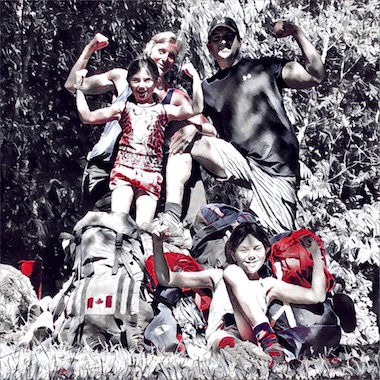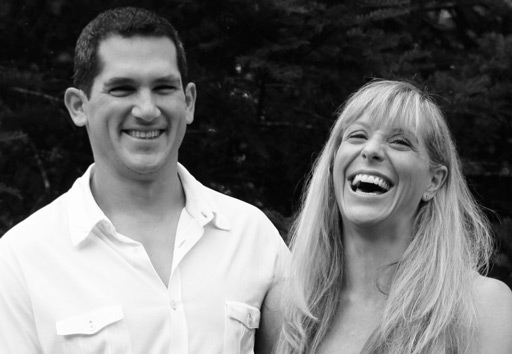If your children are whining, unwilling to help out, talking back, or you just want to build exceptional little humans, take them camping.
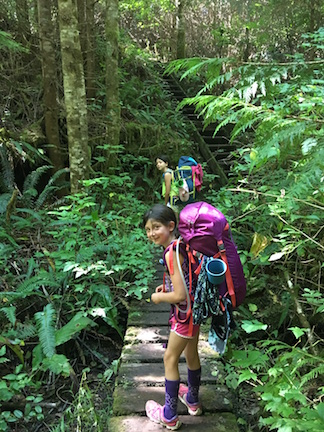
You’ve heard of the saying “No pain, no gain” but have you ever applied that to raising your children?
Our family has just completed our first backcountry hiking trip where our girls were active participants in carrying their own gear, setting up camp and making food.
Yes, there were a few tears, a couple fights and heels dug into the ground but by the end of the trip, our girls were glowing with new confidence, pride and newly acquired skills that will only serve them well in life.
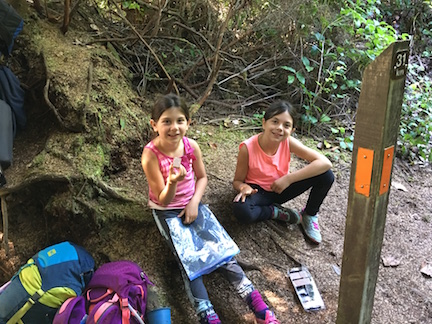
In order for children to develop and grow they need to be able to take risks, push themselves, manage disappointments and consequences.
Unfortunately, this philosophy has gotten a little lost over the last few decades with greater focus being placed on keeping kids safe, limiting their risk-taking and (making life easier for them) dealing with minor consequences.
The last thing you want your child to do is to get hurt but perhaps that is the one thing you should be allowing your child to do regularly, on their terms. (We’re not talking about rush to the hospital hurt here).
Life is risky, life hurts and we need to prepare our children to be able to cope with this.
Why Camping?
How can camping help with this?
Besides the value of nature for health and restoration (read Getting Enough Vitamin N and 10 Effects of Being Unplugged, Bored, and Dirty), taking your child camping opens up new and exciting experiences.
Why are these experiences exciting? Because they veer away from everyday routines and open up a whole new world for your child to learn and explore.
I’m not talking about purposely setting your child up to get physically or emotionally hurt but allowing them to push themselves where the outcome can be one of growth, whether the results be euphoric or disappointment.
Camping not only allows your child to take more risks but allows for you to take more risks too. The more you open yourself up to try new situations and experiences, the more your children will follow your lead.
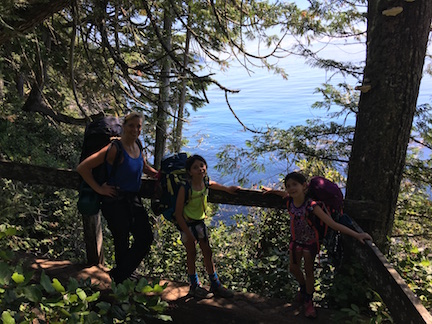
*By the way, camping is not really risky at all. Certain aspects are potentially more hazardous than staying at home and others are less. Well managed camping is a lot less risky than many popular activities kids partake in at home, like hockey, football, basketball, skateboarding, Pokemon Go, etc.
5 Reasons Your Kids Should Experience Camping
-
It gives them confidence by trying new things
Getting away from familiar environments and routines opens up new situations that your child has to try. Take our hiking trip for example. Our girls had to carry their packs. There was no other option because we had our own packs to carry and there was no way possible that we could take on any more weight. Yes, there was some complaining during the trip about the packs being too heavy and blaming the packs for a trip or fall. But at the end of the trip, the confidence that they gained from completing the trip carrying their own stuff was unbelievable. Something that will translate over to their everyday challenges.
-
They learn that things aren’t fair
In nature, you learn that the natural world isn’t fair but practical. Learning to make a fire or build a shelter isn’t easy or fair and the outcomes rely on many factors such as perseverance, knowledge, respect. And sometimes no matter how hard you try you will fail. Children see the injustices that occur daily in nature and are able to learn from them.
-
They learn “real” survival skills
This might not be something that crosses your mind too often but these are important skills for your child to learn. Learning true survival skills takes a child’s self-reliance and competency to another level. Things like situational awareness, food rationing, patience, perseverance, cleanliness, and organization are naturally enhanced by being a part of the camping dynamic. Being out in the woods and not having access to comforts or even the ability to obtain more food brings on a new awareness of priorities.
-
They learn how to deal with situations without a variety of options.
When they are camping they are at the mercy of the elements. They may find themselves in the middle of a downpour, a drop in temperature or without regular comforts. Learning that they can make it through these type of situations expands their coping skills and self-confidence. Having to deal with the situation at hand is a rewarding experience when you get through it.
-
They learn how to work as part of a team
This requires parents to put in the effort of getting their kids involved and handing off tasks. The payoff is huge and well worth the effort. These skills then transfer back into the home. Teaching them to set up a tent, light a fire, hang a tarp not only gives them a feeling of self-worth but empowers them as a contributing participant in the experience.
When given the opportunity, kids will exceed your expectations. Help them discover new strengths, take advantage of the restorative and bonding effects of nature and go camping together.
If you are not ready to take the full plunge, pitch a tent in the backyard or do a cookout at a local park/picnic spot and get the kids involved. After putting effort into this for the last year, our kids are pitching their own tent, getting water, helping with cleaning and understand the nuances of camping which has taught them to be patient and helpful rather than whiney and demanding – at least some of the time 😉
Perhaps the biggest payoff for this effort is the added help we get around the house when we are not camping. As we write this our kids are watering the plants, feeding the dog and picking the ripe cherry tomatoes from our garden.
In conclusion:
Camping is a pure form of existence that is reminiscent of a time long ago when the whole family contributed to making the homestead work.
By investing in the outdoor education that is part of the camping experience, we raise kids that are confident, adventurous, self-reliant, resilient, strong in every sense, and capable of supporting a group effort.
